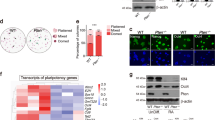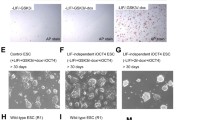Abstract
The unlimited proliferation capacity of embryonic stem cells (ESCs) coupled with their capability to differentiate into several cell types makes them an attractive candidate for studying the molecular mechanisms regulating self-renewal and transition from pluripotent state. Although the roles of 6-phosphofructo-2-kinase/fructose-2,6-bisphosphatase family (PFKFB1-4) in cell survival, proliferation, and differentiation in tumor cells have been studied, their role in mouse ESC (mESC) biology is currently unkown. In the current study, Pfkfb isoenzyme expressions were analyzed in R1 and J1 mESCs that were cultured in the presence and absence of leukemia inhibitory factor (LIF). We report that expression of the Pfkfb3 isoenzyme was markedly increased when mESCs were promoted to differentiate upon LIF removal. We then demonstrated that Pfkfb3 silencing induced the differentiation marker Brachyury suggesting that Pfkfb3 may be required for the regulation of mesodermal differentiation of mESCs. Furthermore, we show that the increase in Pfkfb3 expression is required for the growth of early differentiated mESCs. Although these results provide important insights into the early differentiation of mESCs with regard to Pfkfb expressions, further mechanistic studies will be needed for understanding the pathways and mechanisms involved in regulation of proliferation and early differentiation of mESCs through Pfkfb3.





Similar content being viewed by others
Data availability
The datasets used and/or analyzed during the current study are available from the corresponding author on reasonable request.
References
Al-Tubuly, (2000) SDS-PAGE and western blotting. Methods Mol Med 40:391–405
Ando M, Uehara I, Kogure K, Asano Y, Nakajima W, Abe Y (2010) Interleukin 6 enhances glycolysis through expression of the glycolytic enzymes hexokinase 2 and 6-phosphofructo-2-kinase/fructose-2,6-bisphosphatase-3. J Nippon Med Sch 77:97–105
Brons I, Smithers L, Trotter M, Rugg-Gunn P, Sun B, Lopes S, Howlett S, Clarkson A, Ahrlund-Richter L, Pedersen R, Vallier L (2007) Derivation of pluripotent epiblast stem cells from mammalian embryos. Nature 448:191–195
Cha Y, Han MJ, Cha HJ, Zoldan J, Burkart A, Jung JH (2017) Metabolic control of primed human pluripotent stem cell fate and function by the miR-200c–SIRT2 axis. Nat Cell Biol 19:445–456
Cherepkova MY, Sineva GS, Pospelov VA (2016) Leukemia inhibitory factor (LIF) withdrawal activates mTOR signaling pathway in mouse embryonic stem cells through the MEK/ERK/TSC2 pathway. Cell Death and Dis 7:e2050
Chesney J, Telang S, Yalcin A, Clem A, Wallis N, Bucala R (2005) Targeted disruption of inducible 6-phosphofructo-2-kinase results in embryonic lethality. Biochem Biophys Res Commun 331:139–146
Clem B, Telang S, Clem A, Yalcin A, Meier J, Simmons A, Rasku MA, Arumugam S, Dean WL, Eaton J, Lane A, Trent JO, Chesney J (2008) Small-molecule inhibition of 6-phosphofructo-2-kinase activity suppresses glycolytic flux and tumor growth. Mol Cancer Ther 7:110–120
Domenech E, Maestre C, Esteban-Martinez L, Partida D, Pascual R, Fernandez Miranda G, Seco E, Campos-Olivas R, Perez M, Megias D (2015) AMPK and PFKFB3 mediate glycolysis and survival in response to mitophagy during mitotic arrest. Nat Cell Biol 17:1304–1316
Dunwoodie SL (2009) The role of hypoxia in development of the mammalian embryo. Dev Cell 17:755–773
Griesel BA, Matsuzaki S, Batushansky A, Griffin TM, Humphries KM, Olson AL (2021) PFKFB3-dependent glucose metabolism regulates 3T3-L1 adipocyte development. FASEB J 35:e21728
Hamanaka RB, Mutlu GM (2017) PFKFB3, a direct target of p63, is required for proliferation and inhibits differentiation in epidermal keratinocytes. J Invest Dermatol 137:1267–1276
Hirai HJ, Karian P, Kikyo N (2011) Regulation of embry- onic stem cell self-renewal and pluripotency by leu- kaemia inhibitory factor. Biochem J 438:11–23
Hong Y, Schartl M (1996) Establishment and growth responses of early medakafish (Oryzias latipes) embryonic cells in feeder layer-free cultures. Mol Mar Biol Biotechnol 5:93–104
Kim Y, Yi B, Kim N, Choi K (2014) Role of the epithelial–mesenchymal transition and its effects on embryonic stem cells. Exp Mol Med 46:e108
Kurek D, Neagu A, Tastemel M, Tüysüz N, Lehmann J, Van de Werken HJG, Philipsen S, Van der R, Maas A, Van IJcken WFJ, Drukker M, Berge D, (2015) Endogenous WNT signals mediate bmp-induced and spontaneous differentiation of epiblast stem cells and human embryonic stem cells. Stem Cell Rep 4:114–128
Lee YL, Peng Q, Fong SW, Chen AC, Lee KF, Ng EH (2012) Sirtuin 1 facilitates generation of induced pluripotent stem cells from mouse emb ryonic fibroblasts through the miR-34a and p53 pathways. PLoS ONE 7:e45633
Livak KJ, Schmittgen TD (2001) Analysis of relative gene expression data using real-time quantitative PCR and the 2(-Delta Delta C(T)) method. Methods 25(4):402–408
Mathieu J, Ruohola-Baker H (2017) Metabolic remodeling during the loss and acquisition of pluripotency. Development 144:541–551
Mu WL, Wang YJ, Xu P, Hao DL, Liu XZ, Wang TT (2015) Sox2 deacetylation by sirt1 is involved in mouse somatic reprogramming. Stem Cells 33:2135–2147
Niwa H, Ogawa K, Shimosato D, Adachi K (2009) A parallel circuit of LIF signalling pathways maintains pluripotency of mouse ES cells. Nature 460:118–122
Novellasdemunt L, Navarro-Sabaté À, Manzano A, Rodríguez-García A, Bartrons R (2013) PFKFB3 (6-phosphofructo-2-kinase/fructose-2,6-biphosphatase 3). Atlas Genet Cytogenet Oncol Haematol. https://doi.org/10.4267/2042/51425
Ochocki JD, Simon MC (2013) Nutrient-sensing pathways and metabolic regulation in stem cells. J Cell Biol 203(1):23–33
Pegoraro C, Maczkowiak F, Monsoro-Burq AH (2013) Pfkfb (6-phosphofructo-2-kinase/fructose-2,6-bisphosphatase) isoforms display a tissue-specific and dynamic expression during Xenopus laevis development. Gene Expr Patterns 13:203–211
Pegoraro C, Figueiredo AL, Maczkowiak F, Pouponnot C, Eychène A, Monsoro-Burq AH (2015) PFKFB4 controls embryonic patterning via Akt signalling independently of glycolysis. Nat Commun 6:5953. https://doi.org/10.1038/ncomms6953
Peng F, Li Q, Sun J, Luo Y, Chen M, Bao Y (2018) PFKFB3 is involved in breast cancer proliferation, migration, invasion and angiogenesis. Int J Oncol 52:945–954
Piquet-Pellorce C, Grey L, Mereau A, Heath JK (1994) Are LIF and related cytokines functionally equivalent? Exp Cell Res 213:340–347
Raz R, Lee CK, Cannizzaro LA, d’Eustachio P, Levy DE (1999) Essential role of STAT3 for embryonic stem cell pluripotency. Proc Natl Acad Sci USA 96:2846–2851
Shyh-Chang N, Ng H-H (2017) The metabolic programming of stem cells. Genes Dev 31:336–346
Si X, Chen W, Guo X, Chen L, Wang G, Xu Y (2013) Activation of GSK3beta by Sirt2 is required for early lineage commitment of mouse embryonic stem cel. PLoS ONE 8:e76699
Simon MC, Keith B (2008) The role of oxygen availability in embryonic development and stem cell function. Nat Rev Mol Cell Biol 9:285–296
Song L, Chen J, Peng G, Tang K, Jing N (2016) Dynamic Heterogeneity of brachyury in mouse epiblast stemcells mediates distinct response to extrinsic bonemorphogenetic protein (BMP) signaling. J Biol Chem 291:15212–15225
Tesar PJ, Chenoweth JG, Brook FA, Davies TJ, Evans EP, Mack DL, Gardner RL, McKay RDG (2007) New cell lines from mouse epiblast share defining features with human embryonic stem cells. Nature 48:196–199
Tsogtbaatar E, Landin C, Minter-Dykhouse K, Folmes CDL (2020) Energy metabolism regulates stem cell pluripotency. Front Cell Dev Biol 8:87
Van Schaftingen E, Lederer B, Bartrons R, Hers HG (1982) A kinetic study of pyrophosphate: fructose-6-phosphate phosphotransferase from potato tubers. Application to a microassay of fructose 2,6-bisphosphate. Eur J Biochem FEBS 129:91e195
Weinberger L, Ayyash M, Novershtern N, Hanna JH (2016) Dynamic stem cell states: naive to primed pluripotency in rodents and humans. Nat Rev Mol Cell Biol 17:155–169
Yalcin A, Clem BF, Simmons A, Lane A, Nelson K, Clem AL, Brock E, Siow D, Wattenberg B, Telang S, Chesney J (2009) Nuclear targeting of 6-phosphofructo-2-kinase (PFKFB3) increases proliferation via cyclin-dependent kinases. J Biol Chem 284:24223–24232
Yalcin A, Clem BF, Imbert-Fernandez Y, Ozcan SC, Peker S, O’Neal J, Klarer AC, Clem AL, Telang S, Chesney J (2014) 6-Phosphofructo-2-kinase (PFKFB3) promotes cell cycle progression and suppresses apoptosis via Cdk1-mediated phosphorylation of p27. Cell Death Dis 5:e1337
Zakrzewski W, Dobrzynski M, Szymonowicz M, Rybak Z (2019) Stem cells: past, present, and future. Stem Cell Res Ther 10:68
Zhou W, Choi M, Marginean D, Margaretha L, Hesson J, Cavanaugh C (2012) HIF1alpha induced switch from bivalent to exclusively glycolytic metabolism during ESC-to-EpiSC/hESC transition. EMBO J 31:2103–2116
Zhu J, Kwan KM, Mackem S (2016) Putative oncogene Brachyury (T) is essential to specify cell fate but dispensable for notochord progenitor proliferation and EMT. Proc Natl Acad Sci USA 113:3820–3825
Acknowledgements
This work was supported by the Scientific Research Fund of Bursa Uludag University [grant number# OUAP(V)-2013/27] and Scientific and Technological Research Council of Turkey [grant number#116Z570).
Funding
This study was supported by the Scientific Research Fund of Bursa Uludag University [grant number# OUAP(V)-2013/27] and Scientific and Technological Research Council of Turkey [grant number#116Z570).
Author information
Authors and Affiliations
Contributions
Conceptualization: SG and AY.; Analysis of experiments, data curation: SG, THA and YG.; Funding Acquisition: SG; Writing: SG; Review and Editing: AY.
Corresponding authors
Ethics declarations
Competing interests
The authors declare that they have no relevant financial or non-financial interests to disclose.
Ethical approval
Not applicable.
Consent to participate
Not applicable.
Additional information
Publisher's Note
Springer Nature remains neutral with regard to jurisdictional claims in published maps and institutional affiliations.
Rights and permissions
Springer Nature or its licensor (e.g. a society or other partner) holds exclusive rights to this article under a publishing agreement with the author(s) or other rightsholder(s); author self-archiving of the accepted manuscript version of this article is solely governed by the terms of such publishing agreement and applicable law.
About this article
Cite this article
Guzel, S., Gurpinar, Y., Altunok, T.H. et al. Increased expression of 6-phosphofructo-2-kinase/fructose 2,6-bisphosphatase-3 is required for growth of mouse embryonic stem cells that are undergoing differentiation. Cytotechnology 75, 27–38 (2023). https://doi.org/10.1007/s10616-022-00557-9
Received:
Accepted:
Published:
Issue Date:
DOI: https://doi.org/10.1007/s10616-022-00557-9




